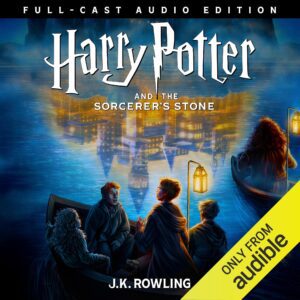Harry Potter and the Sorcerers Stone (Full-Cast Edition) Audiobook
Harry Potter and the Sorcerers Stone Audiobook (Full-Cast Edition)

text
Harry Potter and the Sorcerer’s Stone: Full-Cast Audiobook Versions – A Comprehensive Overview
Introduction
Harry Potter and the Sorcerer’s Stone—first published in 1997 in the UK as Harry Potter and the Philosopher’s Stone—marked the beginning of one of the most successful fantasy series in history. While print editions captured the imagination of millions, the audiobook format brought the magical world of Hogwarts to life in a completely different way. Over the years, the novel has been recorded in several audiobook versions—most notably single-narrator recordings by Stephen Fry (UK) and Jim Dale (US). However, some fans may encounter full-cast dramatizations, which differ greatly from traditional audiobooks.
This article explores those full-cast interpretations, their production styles, the notable performances, and how they stand alongside conventional audiobook narrations.
Single-Narrator vs. Full-Cast Audiobooks
A single-narrator audiobook relies on one performer to voice every character. In the case of Sorcerer’s Stone, Jim Dale’s U.S. edition and Stephen Fry’s UK edition have each been praised for their ability to bring dozens of characters to life through vocal skill.
A full-cast version, on the other hand, employs different actors for different roles—similar to a radio play or audio drama—creating a much richer soundscape. Rather than a sole narrator switching between voices, you hear Harry, Ron, Hermione, Dumbledore, and others portrayed by distinct performers, often accompanied by music, ambience, and sound effects.
Notable Full-Cast Adaptations
While J.K. Rowling’s Harry Potter has no official full-cast audiobook produced by the major publishers (such as Audible or Pottermore) in standard commercial circulation, several adaptations have approached that format:
- BBC Radio Dramatizations – The BBC has a long history of full-cast audio plays. While not a straight-linear reading of Sorcerer’s Stone, certain licensed or adapted broadcasts resemble a “full-cast audiobook” in style, complete with Foley effects and musical scoring.
- Fan-Made Productions – Some large-scale fan efforts recreate Sorcerer’s Stone as a serialized audio drama with different voice actors for each character. These are usually non-commercial, produced for community enjoyment, and may include atmospheric sounds to mimic the cinematic world.
- Stage-Play Audio Captures – In some regions, theater productions have made archival recordings with original cast voices. These are not published as official audiobooks but can feel similar in performance style.
The Full-Cast Experience
What sets full-cast Sorcerer’s Stone versions apart from single-narrator readings is immersion. With multiple voice actors:
- Character Distinction becomes immediate—listeners don’t have to rely on vocal changes alone to know who’s speaking.
- Emotional Range is more dynamic—actors can focus entirely on portraying their character’s emotional beats without worrying about narrative exposition.
- Cinematic Feel arises from music, effects, and spatial audio cues.
For example, a scene in the Great Hall might include murmuring voices layered in the background, footsteps echoing, and the distinct timbres of each character’s voice panning from left to right around the listener.
Casting Choices and Performance Styles
In true full-cast editions, casting decisions aim to reflect each character’s personality accurately:
- Harry Potter – Often voiced by a young actor or someone who can convey a mix of curiosity, bravery, and uncertainty.
- Hermione Granger – A clear, precise voice with a confident, slightly academic tone.
- Ron Weasley – Warm, humorous, slightly self-deprecating delivery to match the character’s heart and wit.
- Professor Dumbledore – Deep, calm, and wise, with subtle layers of mystery.
- Severus Snape – Slow, deliberate speech with a silkier, darker register.
The ensemble typically includes 20–30 performers, depending on production scope.
Sound Design and Atmosphere
Full-cast Sorcerer’s Stone presentations make heavy use of sound effects to create scenes:
- Hogwarts: Echoing corridors, sweeping wind through the castle’s towers.
- Quidditch Matches: Crowd cheers, broomstick whooshes, commentators’ voices layered over environmental sounds.
- Magic Spells: Sparkling or booming audio cues for wand effects.
Music cues are typically original compositions designed to match moods—cheerful for Weasley family moments, mysterious for Forbidden Forest sequences, tense for challenges faced by Harry and his friends.
Reception Among Fans
Fans tend to be split:
- Audiobook Purists often prefer a skilled single narrator because it allows uninterrupted imaginative control.
- Immersion Seekers enjoy the cinematic approach of full-cast productions, feeling it adds richness and excitement.
Full-cast versions are often recommended for younger listeners or group settings, as they resemble a theater performance.
The Future of Full-Cast Harry Potter Audio
As immersive audio platforms like Audible, Spotify Audiobooks, and specialty services expand, there’s growing demand for official full-cast adaptations of popular books. With advances in spatial audio and 3D sound design, a future release of Harry Potter and the Sorcerer’s Stone in a high-production, Dolby Atmos-style drama could transform the way fans experience the series.
However, official projects would require complex rights negotiations due to J.K. Rowling’s close involvement in licensing decisions and the exclusivity agreements already in place with existing audiobook distributors.
Conclusion
While the most widely recognized Harry Potter and the Sorcerer’s Stone audiobooks remain the single-narrator versions by Jim Dale and Stephen Fry, the concept of a full-cast performance offers a unique listening experience. Multiple voices, rich soundscapes, and theatrical pacing make the story feel alive in a different way.
For fans interested in immersive storytelling, seeking out dramatized or fan-made full-cast versions can be rewarding, even if they sit outside the realm of official releases. The magic of Hogwarts truly shines when many voices come together—much like the teamwork and friendship at the heart of the story.